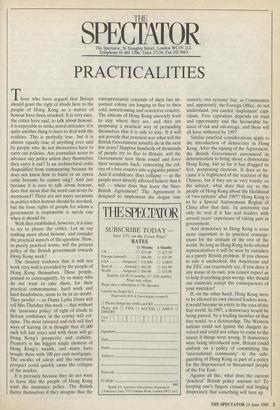SPECT THE AT OR
The Spectator, 56 Doughty Street, London WC1N 2LL Telephone 01-405 1706; Telex 27124; Fax 242 0603
PRACTICALITIES
Those who have argued that Britain should grant the right of abode here to the people of Hong Kong as a matter of honour have been attacked. It is very easy, the critics have said, to talk about honour, it is enjoyable to strike moral attitudes: it is quite another thing to have to deal with the realities. This is perfectly true, but it is almost equally true of anything ever said by people who do not themselves have to carry out policies. Are journalists never to advance any policy unless they themselves then carry it out? Is an architectural critic disqualified from commenting because he does not know how to build or an opera critic because he cannot sing? And just because it is easy to talk about honour, does that mean that the word can never be mentioned? There are not many occasions in politics when honour should be invoked but the basic rights of people for whom a government is responsible is surely one when it should be.
With that established, however, it is time to try to please the critics. Let us say nothing more about honour, and consider the practical aspects of the question. How, in purely practical terms, will the present policy of the British government towards Hong Kong work? The clearest evidence that it will not work very well is provided by the people of Hong Kong themselves. These people, praised so extravagantly, by so many who do not want to take them, for their practical commonsense, hard work and hard-headedness, seem to be in no doubt. They predict — as Dame Lydia Dunn will tell Mrs Thatcher this week — that without the 'insurance policy' of right of abode in Britain confidence in the colony will col- lapse. The most talented and rich will find ways of leaving (it is thought that 45,000 such left last year) and with them will go Hong Kong's prosperity and stability. Property is the biggest single element of Hong Kong's wealth, and many have bought there with 100 per cent mortgages. The exodus of talent and the uncertain prospect could quickly cause the collapse of the market.
It is precisely because they do not want to leave that the people of Hong Kong want the insurance policy. The British flatter themselves if they imagine that the entrepreneurial orientals of their last im- portant colony are longing to flee to their cold, unwelcoming and restrictive country. The citizens of Hong Kong sincerely want to stay where they are, and they are proposing a practical way of persuading themselves that it is safe to stay. If it will not provide that practical way what will the British Government actually do in the next few years? Suppose hundreds of thousands of people try to flee to Britain, will the Government turn them round and force their occupants back, converting the col- ony of a free country into a gigantic prison? And if confidence does collapse — as the people most directly affected believe that it will — where does that leave the Sino- British Agreement? The Agreement is designed to implement the slogan 'one country, two systems' but, as Communists and, apparently, the Foreign Office, do not understand, you cannot 'implement' capi- talism. Free capitalism depends on trust and opportunity and the favourable ba- lance of risk and advantage, and these will all have withered by 1997.
Similar practical considerations apply to the introduction of democracy in Hong Kong. After the signing of the Agreement, the British Government announced its determination to bring about a democratic Hong Kong, but so far it has dragged its feet, postponing elections. It does so be- cause it is frightened of the reaction of the Chinese, but if they are so very touchy on the subject, what does that say to the people of Hong Kong about the likelihood of 'two systems' after 1997? Hong Kong is to be a Special Autonomous Region of China after that date. Its autonomy can only be real if it has real leaders with several years' experience of taking part in government.
And democracy in Hong Kong is even more important in its practical consequ- ences for the attitude of the rest of the world. So long as Hong Kong lacks elected representatives it will be seen by outsiders as a purely British problem. If you choose to rule it unchecked, the Americans and the EEC can reasonably say, if you deny it any status of its own, you cannot expect us to help if anything goes wrong: why should our countries accept the consequences of your mistakes?
If, on the other hand, Hong Kong were to be allowed its own elected leaders soon, it would become an entity in the eyes of the free world. In 1997, a democracy would be being passed, by a leading member of that free world, to a dictatorship. The Western nations could not ignore the dangers in- volved and could not refuse to come to the rescue if things went wrong. If democracy were being introduced now, Britain could embark on a policy of committing the 'international community' to the safe- guarding of Hong Kong as part of a policy for the dispossessed or threatened people of the Far East.
Against all this, what does the current 'practical' British policy amount to? To keeping one's fingers crossed and hoping desperately that something will turn up.










































































 Previous page
Previous page